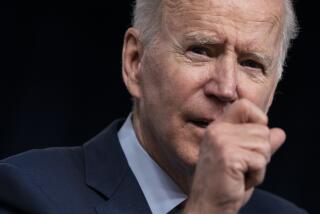WASHINGTON INSIGHT
- Share via
FILLING THE BENCH: Interior Secretary Bruce Babbitt, who President Clinton almost named to the Supreme Court last summer, is once again under serious consideration. Well-placed Administration sources say a decision could come early this week. . . . One reason that Babbitt has moved up in contention is that interest in federal appeals court Judge Richard S. Arnold, one of the early favorites, has declined because of his health problems. . . . Also still being considered are federal appeals court Judge Amalya Kearse and U.S. District Judge Jose A. Cabranes, who would be the first Latino nominee for the high court. The White House is said to have assured the Congressional Hispanic Caucus that if Babbitt gets the nod, Latino Rep. Bill Richardson (D-N.M.) will replace him in the Cabinet.
*
ON A ROLL: Flush from stunning victories on assault weapons and waiting periods, gun-control advocates plan to seize the momentum and press Congress for even more ambitious legislation. The new bill, which had been moving slowly until now, would require a license (backed by fingerprint checks and safety training) to buy a handgun. It also would impose stiff fees to weed out shady gun dealers and would compel registration of handgun transfers. “We have a good foundation, but we must move forward with other sensible controls,” Susan Whitmore of Handgun Control Inc. declared after the House voted to ban 19 types of assault-style guns. . . . The new bill is dubbed “Brady 2,” an expansion of the enacted Brady bill, which mandates a five-day waiting period for handgun purchases. Once again, James S. Brady, the former presidential press secretary gunned down in the assassination attempt on Ronald Reagan, is vigorously lobbying the measure along with his wife, Sarah, chairwoman of Handgun Control. But supporters, well aware that the vaunted gun lobby can be potent even when wounded, are digging in for a long fight. “The majority of states already have licensing and registration for handguns, but putting that on a national basis will require a lot of education of the American public,” Whitmore said.
*
SOB STORIES: Tears play an occasional bit part in American politics. Remember when then-Sen. Edmund Muskie (D-Me.) wept over a letter in a New Hampshire newspaper accusing him of racial slurs? Although the letter was later found to be the work of a Republican dirty trickster, the incident finished off Muskie’s 1972 presidential campaign. And remember when Rep. Patricia Schroeder (D-Colo.) ended her quixotic 1988 presidential run in tears? After people snickered about the cry, Schroeder rejoined that “tears signify compassion, not weakness.” . . . These days, with the President and other highnesses choking up here and there, tears seem to be in fashion. In fact, after Sen. Bob Dole (R-Kan.)--widely perceived as a hard-shelled hatchet man--broke down while delivering a eulogy at Richard Nixon’s funeral, Republican politicians at a meeting in Atlanta spoke of how Dole might have helped his 1996 White House prospects. “It showed,” one Southern conservative said, “that he had compassion.”
*
WHY NOT WALK? The $18-million Senate subway train--the one with wind-shielded cars to keep senators from mussing their hair on the way to the Capitol from their offices--crashed into a wall on its first trial run, sources say. The tracks are being adjusted.
More to Read
Get the L.A. Times Politics newsletter
Deeply reported insights into legislation, politics and policy from Sacramento, Washington and beyond. In your inbox twice per week.
You may occasionally receive promotional content from the Los Angeles Times.










